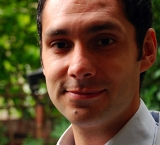Hack:
Beautiful working and learning: remembering we are less like cogs and more like swirls
This hack is about growing collective knowledge and potential in a way that is fit for human purpose. I refer to some work I did with an international group of health practitioners earlier this year. See links to the full blog at the end of the hack.
For this group, the challenge is to constantly connect and share best practice and action internationally - in matters that are literally of life and death. Here, I helped to explore more human ways of working - using processes of collective imagination, visioning (related to story) and then play.
To frame this, I share two key propositons:
The first is that we have different ways of 'knowing' (see a link to Peter Reason's work at the end on this). When we transfer knowledge or understanding, we must not only account for 'propositional knowing' (concepts, abstracts, theories) but also for experiential knowing (what we learn by sensing as we move through the world), practical knowing (hands on trial and error) and then we get into a magical space that is about unquantifiable stuff - the stuff that is about describing the taste of wine, or the wonder of a great piece of art, or the energy that comes from an amazing sports play. This is what Peter Reason calls 'presentational knowing'. It is unexplainable in propositional concept - to understand it we need images, sound, metaphor, stories, poetry, dance and so on. It is the stuff that moves us deep inside - where real change can come.
The second proposition is that by keeping doing the same things of the past, we won't really create any new outcomes in future. Simple enough... the trick is that we become really bad at letting go of past habits, and while children can very easily step into new realms of play and possibility to explore new future states, we kind of forget how to do this. And the more serious things get, the more difficult we seem to find to find playful states.
In the context of management innovation (or 'Beautiful Business' - how I am framing my work - see link below) , this all relates to a notion that we must rediscover and develop fundamentally more inspiring ways of learning and adapting as a whole. We are not machines and must not work as machines. Less like cogs in a big wheel, we are more like swirls in a bloody cool chocolate Willie Wonka river. Hop on this boat, and life seems to have more colour, flavour - and possibility.
We must continue exploring these more creative forms of working in the workplace. At one level it is about recognising we are humans and we need more fluid and colourful ways of working. At another, this is about developing ways of working more collaboratively and effectively in an increasingly complex world in which we face some really serious challenges as a whole. More so, I think when we see the world from this perspective it is easier to see we are part of a wider system - and it becomes easier to work with the whole in the mind and heart - and this is a crucial shift in consciousness to achieving great things in how we all grow in better ways.
I used a quote in the session which is worth sharing here. (Thanks to Chris Seeley from Ashridge Business School for introducing me to it).
“There is no scientific evidence that seriousness leads to greater growth, maturity, or insight into the human condition than playfulness.” John Paul Lederach, 2005
Ole!
See the full article here: http://www.kessels-smit.com/info.pl/en/learning_company/1171
See related blog entries on 'Beautiful Business' here: http://beautifulbusiness.tumblr.com/
See Peter Reason's work here: www.peterreason.eu
Great idea to constantly connect and rejuvenate, Andres. I was especially intrigued by the work you did with an international group of health practitioners earlier this year. Thanks for adding the links to blog, which I read with interest. Love your notion of rediscovering and developing fundamentally more inspiring ways of learning and adapting as a whole. Well articulated and thanks!
Would you agree that we are more and more able to explain the differences we bring to knowing – yet we remain in yesteryears about how to act on these revelations? That’s significant since the brain changes daily when we act on new practices – and in fact waits for that action.
Your second proposition links to the first in that we cling to past practices – that block the very change we crave! Interestingly the brain comes equipped to cling, in that it holds a basal ganglia that gathers and stores and replays old practices. So long after we think we change – we tend to default back to the subtleties that keep us down. It’s the working memory that gets us where you want us here – and that presents far more challenge than most folks realize. Why so?
The process of learning brainpowered skills can be brutal for adults since learning requires massive rewiring of vast cortical connections. It’s far more difficult than simply learning new leader approaches – because the new skills are in plastic competition with neural networks that developed deep leader ruts to get us into current quagmires financially and emotionally.
Without doubt, organizational change can appear daunting at first, as you indicate Andres. You said it best – thanks for the interesting take!
- Log in to post comments



You need to register in order to submit a comment.